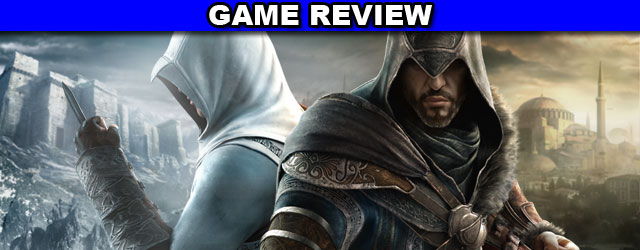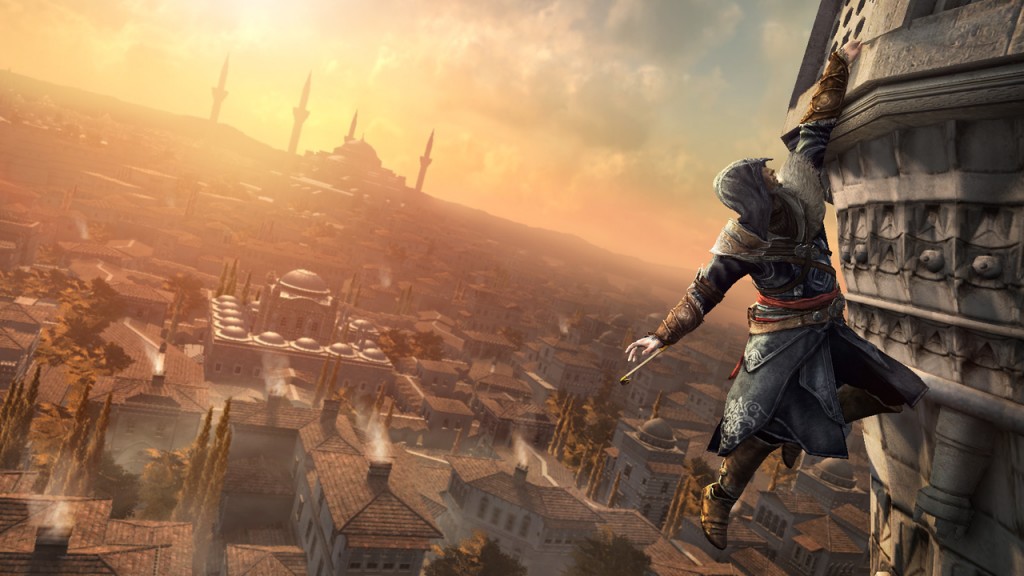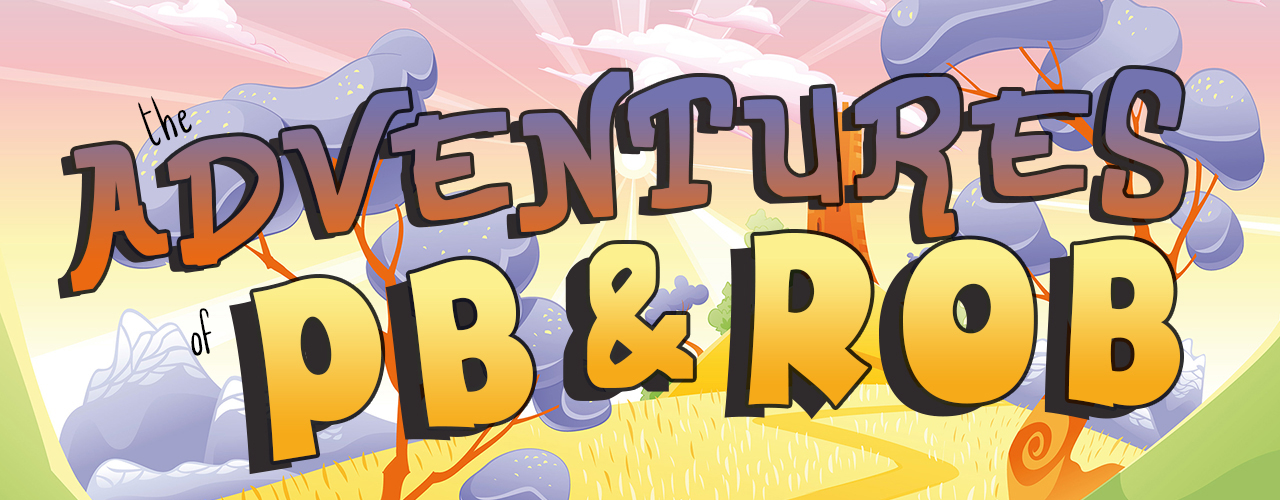Article by: Boyd
For the past three years, we have lived in the past life of Ezio Al’Auditore di Firenze. Ubisoft concludes that which it began in 2009, and it looks like it’s about time for a definitive Assassins Creed III, and not more sequels of a sequel.
Ubisoft has been cranking out Assassin’s Creed games for the past three years, trying to innovate both gameplay and multiplayer experiences into a unique package. Revelations, the third installment in the story that started in the second game, and followup to Brotherhood, returns again to the now all too familiar gameplay of the Assassin’s Creed series. Some “hits” and some misses, Revelations could have been a more ambitious conclusion to the current story arc, but overall, misses the “mark” by just a bit.
Story: Revelations begins pursuant to the events of Brotherhood. Desmond Miles is trapped in the Animus, yet is able to directly access the memories of Ezio thanks to the help of Subject Sixteen. The whole interplay between Desmond and Sixteen had a strange Tron-like feel to it since both are stuck in a digital world. In classic literary tradition, this, more than any other series entry, is a frame story, with Desmond’s story framing Ezio’s, and Ezio’s framing Altairs’ flashbacks. The Desmond bit being a smaller part of a complex story, the meat of the game is Ezio’s memories. Now in Constantinople, probably the heart of the Ottoman Empire in the 1500’s, Ezio is on a quest for the five keys of Masyaf. These access five memories of Altair (who you also play as in flashback sequences) and the secret he has buried in Masyaf long ago. Couple this quest with the turmoil in Constantinople that the Templars have brought to the city, and you are thrust into the final chapter to ensure the Templar menace is stopped. Is this for good? Far from it, as by the end of the game, shocking, albeit cryptic revelations are made.
Gameplay: While the story for Revelations was intriguing for the most part, the final chapter for both Ezio and Altair left me wanting. The gameplay is petty much the set of standard modifications made in Brotherhood, with two notable additions. The “hookblade” replaces one of Ezio’s hidden blades, and allows him to “zipline” through the city and execute a rollover move in combat (sadly, didn’t use this once). Hookblade = useless addition. The other innovation is the ability of bomb crafting, enabling the player to craft various types of bombs for the purposes of distraction or combat. This is an interesting addition to the franchise as a whole and breaks up the monotony of the gameplay tasks as you can create bombs out of many different materials, with differing payloads and effects.
This brings us to combat. Sadly, the game has soured me on this aspect. Fundamentally, the combat has not changed since the last entry, but the enemies have gotten more difficult (Janissaries, in particular, the elite Ottoman guard) requiring a mix of pistol, poison, and blade to be utilized in tandem in combat. This disrupts the flow of combat in my opinion, as well as your ability to create kill streaks successfully.
Two additions that were added that really detracted from the game, and definitely DON’T belong in the Assassin’s Creed world are Den Defense and shop upgrade notoriety. An addition to Revelations is the optional (yet annoying when you have to) Den Defense. Depending on your notoriety level, Templars will attack one of your reclaimed dens, at which point you must play a poorly executed tower defense mini game where you assign troops to rooftops to defend your den. This mode might be a great addition to multiplayer, but not the single player campaign. Take note that player notoriety increases when you purchase shops and faction buildings also. I would buy two buildings, then have to reduce my notoriety before it got into the red zone. Reducing it is a chore in itself, with the only ways being bribing a herald or killing a witness (witnesses only appear when your notoriety is very high). Unfortunately, the lollygagging back and forth between buying and bribing hurts the game flow. On the topic of purchasing, by the games end I had not purchased any landmarks in Constantinople, hardly purchased any weapons, and instead of classic art this time around, any of the books available at booksellers. Money collection in this installment, with shop prices soaring, was a lot more difficult to utilize and collect than the last two games.
The Masyaf key quests and high powered action sequences were amusing enough to keep me playing, and Revelations shines when it comes to the Altair flashback missions because we finally find out more about this enigmatic man, at least enough to keep this gamer satisfied. The Desmond sequences (accessed by collecting Animus fragments in the world) leave a lot to be desired, with poor first person platforming. If you really want to find out about Desmond’s past and earn a few trophies, go for it.
Graphics: For a three year old engine, Revelations still looks good compared to most other games. Constantinople and the Bosphors are beautifully rendered, as are the facial expressions of characters. We have come a long way since the original game. Cutscenes, sadly, are mediocre at best with a lot of choppiness and skipping on a few. As good as it looks, the engine shows its age. 3D was added this time around, but time for an upgrade.
Sound: Music has always shined in the series and there’s no exception here. DTS sound would have been a good addition, but the digital gets the job done. The soundtrack builds upon the music from the last game, with subtle changes here and there. The typical combat sounds are present as is the always comical din of the crowd when you climb a wall or barrel through someone escaping from a fight or chase.
 Overall: The culmination of this chapter in what is arguably one of the “top 5” franchises in video games right now is not quite the sharpest blade in the vambrace. Ezio’s blade, however, still shines with purpose. I have no real gripe with Assassin’s Creed: Revelations, I just desire a polished, definitive sequel. This game played like Assassin’s Creed 2.75, and as stated left me wanting more. It is essential playing if you want to see where the story goes for Ezio and Altair, yet it is more of the same of what we saw in Brotherhood. The den defense and notoriety were found to distract this gamer from the tasks at hand, and add a level of frustration I never felt before in the series. Nevertheless, these small gripes aside, Assassin’s Creed: Revelations is a decent pickup, especially if you have been playing the series from day one. Jump once more into the animus before Assassin’s Creed III comes along to decide the fate of the world in what will hopefully be an all-out clash between Templar and Assassin.
Overall: The culmination of this chapter in what is arguably one of the “top 5” franchises in video games right now is not quite the sharpest blade in the vambrace. Ezio’s blade, however, still shines with purpose. I have no real gripe with Assassin’s Creed: Revelations, I just desire a polished, definitive sequel. This game played like Assassin’s Creed 2.75, and as stated left me wanting more. It is essential playing if you want to see where the story goes for Ezio and Altair, yet it is more of the same of what we saw in Brotherhood. The den defense and notoriety were found to distract this gamer from the tasks at hand, and add a level of frustration I never felt before in the series. Nevertheless, these small gripes aside, Assassin’s Creed: Revelations is a decent pickup, especially if you have been playing the series from day one. Jump once more into the animus before Assassin’s Creed III comes along to decide the fate of the world in what will hopefully be an all-out clash between Templar and Assassin.
(Note: PS3 owners will get a copy of the original Assassin’s Creed on their Blu-Ray disc. Also, Assassin’s Creed: Embers is a 20-minute short film detailing what happens to Ezio upon finishing the game.)
[xrr rating=8/10]
Pros:
+ Still great visuals
+ Bomb crafting adds a layer to the game
+ Well researched story
Cons:
– Den defense
– Useless hookblade addition
– Poor notoriety system changes





















Add comment